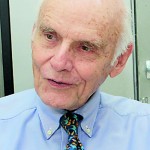News
Simple precautions can keep dengue at bay: Expert
Get busy and make your own vaccine, urged Prof. Scott B. Halstead, considered the ‘Father’ nay ‘Grandfather’ of dengue research, giving an insight into the race for a vaccine in other parts of the world.
Tackling the complex subject of ‘Dengue vaccines: Where are we now’ before members of the Ceylon College of Physicians at the Sri Lanka Medical Association auditorium, he pointed that there is a need to confront this pandemic.
“Let’s do something. Four billion people need a dengue vaccine and this may not happen in our lifetime,” said this renowned expert on infectious diseases. (See box for status of vaccine production)

Prof. Halstead. Pic by Anuradha Bandara
Prof. Halstead is Adjunct Professor, Department of Preventive Medicine and Biometrics, Uniformed Services University of the Health Sciences, Bethesda, Maryland, USA, and Consultant of the Rockefeller Foundation in New York. His other credentials include being the Research Director and Senior Advisor of the Paediatric Dengue Vaccine Initiative — funded by the Bill and Melinda Gates Foundation — of the International Vaccine Institute in Seoul, Korea.
He is known as a world leader in research on vaccines, born in Lucknow, India, having studied in the United States of America and later drafted into the US Army Medical Corps and dabbling in viral diseases in Zama, Japan; Bangkok, Thailand; and the Yale Arbovirus Research Unit, New Haven, Connecticut, USA.
Conceding that he has spent his life working on vaccines, he says how as a young doctor he had no “idea that the US Army did research”. But it certainly did, for one weekend when he was working as a consultant for the World Health Organisation (WHO) he found a thick book on US Army research on yellow fever in the 1920s when it was in occupation in the Philippines.
“In 1929, the US Army had also studied 129 cases of dengue, meticulously detailing every single case along with full names and serial numbers. We found it 50 years after. Dengue 4 had been recorded in 1923 and Dengue 1 in 1929,” says Prof. Halstead.There is no explanation why a second infection with dengue makes people sicker, he points out, adding that there could be 12 different combinations of Dengue 1, 2, 3 and 4, which in turn could cause Dengue Haemorrhagic Fever (DHF) which makes it “incredibly complicated”.
Dealing with Sri Lanka, he says it has been shown that the longer the infections are around, the more virulent dengue has become.
Getting down to the brass tacks of virology, Prof. Halstead says that there is a need to see how viral haemorrhagic fevers such as Yellow Fever, Ebola, Lassa, Junin and DHF cause disease. What happens? How are macrophages (‘big eaters’) which play a very important role in the defence or immune mechanism formed in response to infections by these viral haemorrhagic fevers?
Ebola which has a mortality (death) rate of 50% or 1 in 2, picks up steam and keeps burning. DHF only occupies a niche, with a 1% mortality rate. When someone contracts Ebola that person becomes sick, pretty sick and then dies. DHF, however, peaks only after four to five days of infection. What’s going on? Why is it occurring later? “DHF continues to live up to my expectations,” he says, adding that T-cell immunity is an important component which should be studied closely.
The peak age for two dengue infections has increased. If the infection rate is a huge 50% in one year, the chances of getting infected with Dengue 1, 2, 3 or 4 if you live long enough are more. The second infection is what is important, according to him.He recalls how in Thailand he watched the trail of dengue infections. In 1962, the peak age for dengue was three years, then five years but now it is 11 years. “The issue with dengue is that you can die and the deaths of older children have their own tragedies. Dengue leaves a lingering fear. It is very upsetting and it is also a powerful political disease.”
Asking what can be done about dengue, Prof. Halstead is quick to point out that now people understand better where this mosquito breeds, but they are thoughtless. “When I was born my parents lived in a British cantonment in India and every Friday the servants would scrub all the water jars in the homes. There was no dengue within the cantonment for 50 years,” he recalls.
Adds Prof. Halstead: “Simple actions can keep dengue at bay.”
| Race for producing vaccine: French company leadingThe status of the development of a dengue vaccine: The four pharmaceutical companies in the race to produce a vaccine against dengue are Sanofi based in France, Takeda in Japan, Merck in the United States of America and GlaxoSmithKline (gsk) in the United Kingdom. Sanofi is aiming to sell its three-dose dengue vaccine in the latter part of next year (2015) firstly to Mexico, Brazil and Colombia, it is learnt. The good news is that those given the vaccine will not get severe disease. A small number will be protected against severe disease and parents can rest assured that their children will not die. But they are not getting complete protection and mild disease will occur. Whether it will become more severe with time is the question, according to him. |

